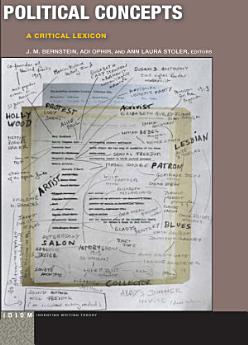Political Concepts: A Critical Lexicon
Om denne e-bog
The explicitness of a radical questioning of this kind gives authors both the freedom and the authority to engage, intervene in, critique, and transform the conceptual terrain they have inherited. Each entry, either implicitly or explicitly, attempts to re-open the question “What is political thinking?” Each is an effort to reinvent political writing. In this setting the political as such may be understood as a property, a field of interest, a dimension of human existence, a set of practices, or a kind of event. Political Concepts does not stand upon a decided concept of the political but returns in practice and in concern to the question “What is the political?” by submitting the question to a field of plural contention.
The concepts collected in Political Concepts are “Arche” (Stathis Gourgouris), “Blood” (Gil Anidjar), “Colony” (Ann Laura Stoler), “Concept” (Adi Ophir), “Constituent Power” (Andreas Kalyvas), “Development” (Gayatri Spivak), “Exploitation” (Étienne Balibar), “Federation” (Jean Cohen), “Identity” (Akeel Bilgrami), “Rule of Law” (J. M. Bernstein), “Sexual Difference” (Joan Copjec), and “Translation” (Jacques Lezra)
Om forfatteren
Adi M. Ophir is a Visiting Professor at the Cogut Institute for the Humanities at Brown University and Professor Emeritus at Tel Aviv University. Among his works are Goy: Israel’s Multiple Others and the Birth of the Gentile, co‐authored with Ishay Rosen-Zvi (Oxford University Press, 2018); Divine Violence: Two Essays on God and Disaster (The Van Leer Institute, 2013); The One-State Condition, co‐authored with Ariella Azoulay (Stanford University Press, 2012); and The Order of Evils: Toward an Ontology of Morals (Zone, 2005).
Ann Laura Stoler is Willy Brandt Distinguished University Professor of Anthropology and Historical Studies at The New School for Social Research, Founding Director of its Institute for Critical Social Inquiry since 2014, and one of the founding editors of Political Concepts: A Critical Lexicon. Her books include Race and the Education of Desire (1995), Carnal Knowledge and Imperial Power (2002), Along the Archival Grain (2009), and Duress (2016).
Stathis Gourgouris is Professor of Comparative Literature and Society at Columbia University. He is author of Dream Nation: Enlightenment, Colonization, and the Institution of Modern Greece; Does Literature Think?: Literature as Theory for an Antimythical Era; Lessons in Secular Criticism; and Ενδεχομένως αταξίες (Contingent Disorders). His most recent book is The Perils of the One.
Gil Anidjar teaches in the Department of Religion and the Department of Middle Eastern, South Asian, and African Studies at Columbia University. He is currently completing a manuscript titled Sparta and Gaza: The Tradition of Destruction; sections of it have been published here and there.
Étienne Balibar is Professor Emeritus of Moral and Political Philosophy at the Université de Paris X Nanterre; Professor Emeritus of Humanities at the University of California, Irvine; and Anniversary Chair in Modern European Philosophy at Kingston University, London. His research in the fields of political, moral, and Marxist philosophy focuses on emancipation, citizenship, and on what he terms “equaliberty.” The breadth of his thought can be gauged from his published works, from Reading Capital, released in 1965 and coauthored with his mentor Louis Althusser, to the more recent We, the People of Europe? Reflections on Transnational Citizenship (2003), Equaliberty (2014), Violence and Civility: On the Limits of Political Philosophy (2015), Citizen Subject: Foundations for Philosophical Anthropology (2017), and Secularism and Cosmopolitanism (2018).
Jacques Lezra is Distinguished Professor in the Departments of English and Hispanic Studies at the University of California, Riverside. His most recent publications are República salvaje (2019), On the Nature of Marx’s Things (2018), Untranslating Machines: A Genealogy for the Ends of Global Thought (2017), and Contra todos los fueros de la Muerte (2016).






